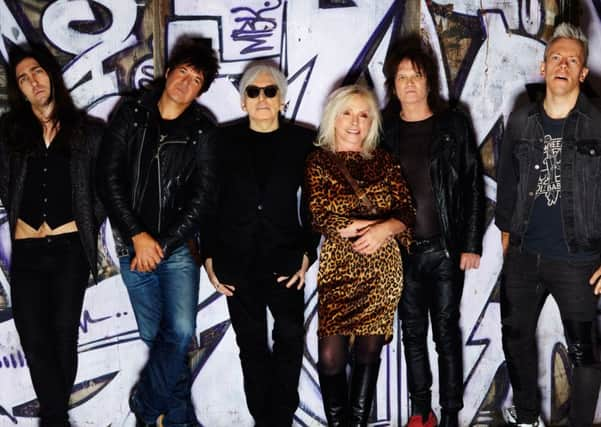Album reviews: Blondie | At the Drive-In | Bonnie Prince Billy | Andrew Wasylyk


POP
Blondie: Pollinator BMG ***
At the Drive-In: in · ter a · li · a Rise Records ****
Bonnie Prince Billy: Best Troubadour Domino ***
Andrew Wasylyk: Themes for Buildings And Spaces Tape Club Records ***
New York punk legends Blondie have always appeared to operate in defiance of their age. Their current producer, John Congleton, has said he aspired to capture a band of veterans in their mature prime, but it seems that Debbie Harry, Chris Stein and Clem Burke have other ideas, because their latest, Pollinator, is the work of a band embarking on the rock star equivalent of hitting the gym and sounding mighty fine for their vintage.
Advertisement
Hide AdAdvertisement
Hide AdThey zip straight off the blocks riding the new wave energy of Doom or Destiny, fuelled with barely contained guitar bravado and a gritty vocal from Harry. Somewhere in the mix, her peers Joan Jett and Laurie Anderson are providing backing vocals. But many of the songs on the album were written by young(er) bucks who cite Blondie as an influence and have mostly given the band something to sink their teeth into.
Dev Hynes, aka Lightspeed Champion, celebrates his adopted home of New York via the sleek disco pop number Long Time, while Brooklyn indie mainstay Dave Sitek contributes the appropriately funky Fun, with Harry on kittenish form. Johnny Marr completes the trio of most memorable hooks on My Monster, garnished with stabs of new wave synth and some guitar heroics from Marr himself.
Elsewhere, they tangle with the top pop writers of the day. Gravity is a decent pop banger written by Charlie XCX, while Best Day Ever, co-written by Sia and Nick Valensi of The Strokes, is a jarring opportunity for Harry to deliver a strident, dissonant vocal.
Mid-paced pop palate cleanser When I Gave Up On You gives the listener a breather, before the band rush headlong back into the fray with the shuffling groove and brass fanfare of Love Level and the widescreen climax of Fragments.
Also still in tip-top condition following an extended hiatus are Chicano punks At the Drive-In. In the 17 years since their previous album, the modern alt.rock classic Relationship of Command, there have been many claimants to their pile-driving punk throne but no equals. Wired and wiry frontman Cedric Bixler-Zavala and incendiary guitarist Omar Rodriguez-López went on to form the adventurous progressive punk titans The Mars Volta but here they strip back their more freeform explorations to deliver 11 taut, truculent tracks, whipping up a gothic post-punk maelstrom on the likes of Governed By Contagions.
Following Willie Nelson’s namecheck for the late Merle Haggard on his new album, Bonnie Prince Billy has dedicated a whole collection to the man he describes as “the most significant junction” in pointing to other country artists. Best Troubadour is very much a personal connoisseur’s choice, rooting deep into Haggard’s vast back catalogue to emerge with a batch of tender, hangdog interpretations which showcase the emotional spectrum of his music from the mischievous I Always Get Lucky With You to the wryly philosophical Wouldn’t That Be Something.
Andrew Wasylyk takes a mesmeric psychogeographical trip round the architecture of his native Dundee on Themes for Buildings And Spaces, comprising one instrumental track for each of eight locations. There’s nothing dark nor satanic in his restful retro amble round the jute mills of Lowe Dens Works. Better known as Andrew Mitchell of The Hazey Janes and now Idlewild repute, he uses his gifts as an arranger on this album of graceful, glacial electronica, occasionally embellishing his soundscapes with mournful trumpet, or paring back to a woozy drone and some suitably spectral washes of ambience on Ghosts of Park Place.
CLASSICAL
Telemann: Concerti per molti stromenti Harmonia Mundi ****
Advertisement
Hide AdAdvertisement
Hide AdGeorg Philipp Telemann’s output is thought to have extended to around 3,000 works, the downside to which has been charges of overproduction: quantity over quality. History has judged him as something of an also-ran compared to his contemporaries Bach and Handel, even though he was, at the time, every bit as celebrated and influential. More recent history has seen a re-evaluation of his musical worth, and of the part he played in shaping the late German Baroque style. The concertos on this inspirational disc by the Akademie für Alte Musik Berlin date from the height of Telemann’s powers around 1710-20, and demonstrate the full extent of his natural flair for fluid and cheerful invention. The combinations are exotic – concertos for, three Trumpets and Timpani, Flutes and Calchedon (a bass lute), and Mandolin and Hammered Dulcimer, among others – and played with bristling joie de vivre.
Ken Walton
JAZZ
Brian Molley Quartet: Colour and Movement BGMM ****
Four years on from his warmly received debut album, Clock, Glasgow saxophonist Brian Molley returned to the studio, once again in the sterling company of pianist Tom Gibbs, bassist Mario Caribé and drummer Stuart Brown, to lay down 12 tracks in 12 key and time signatures. Far from sounding like a musical exercise, the result sings with fluid assurance, right from the fluting soprano sax that heralds Electric Daisy. Bar three covers, the music is Molley’s own, at times reflecting the band’s Far Eastern travels as well as Caribé’s Brazilian roots. And Molley’s tenor sax travels very nicely indeed along a path laid down by the rolling rhythm section in Journeys Hand in Hand, while his soprano is suitably sinuous in Picayune Slinky. There’s the onomatopoeic swinging of Jacksonville, with Gibbs stepping out in fine style, the sumptuously introduced Saanj in the Blue City, and eloquent ballad lyricism in the intriguingly titled Pushkar Push. ■
Jim Gilchrist